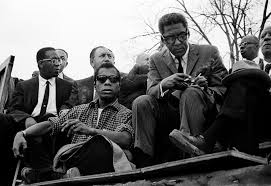In August Wilson’s play The Piano Lesson, the character Doaker issues the following quip about time and how there is no way to stop it. According to Doaker, “Time go long, time go long.” For each of us, “time is the only thing that God ain’t making no more of.” Yet, questions regarding the evaporation of time rarely extend beyond biological deterioration; as we age, our bodies change. A student’s comment pushed me beyond that limited understanding of the impact of time.
During a recent discussion of Marlon T. Riggs’ Ethnic Notions, for a reason I cannot recall, a failing that I attribute to the impact of time on my mind, I was responding to a student’s question of “What occurred after JFK was killed in Dallas?” I proceeded to mention Kennedy’s vice-president Lyndon Baines Johnson’s, commonly termed LBJ, impact on Black America by signing the Civil Rights Act (1964) and Voting Rights Act (1965). To my dismay, an unknowing student raised his hand and asked, “What does LeBron James have to do with this?” Initially, I did not understand the comment. However, after a few moments, I realized this young man associated the initials LBJ with NBA superstar LeBron James, not President Lyndon Baines Johnson.

I place the blame for such disassociation from the US History record on a host of culprits whose actions ensure that Black youth will fail to achieve the success levels of their parents or even grandparents.
Not a semester expires where a student does not attempt to drive home the silly notion that any occurrence before 2000 is “back in the day” and irrelevant to their tenuous present or uncertain future. The inherent dangers of such thinking disassociate African American youth from a past filled with vital information regarding survival strategies their ancestors used to weather the storms of life in a nation that many call a white man’s country.

Not a semester goes by that I am not saddened by African American students’ historical ignorance and illiteracy. Beyond the Rev. Dr. Martin Luther King Jr. or Rosa Parks, Black students tend not to know other Civil Rights icons such as Bayard Rustin, Fannie Lou Hamer, or even a surface-level understanding of Black Nationalist icons Malcolm X, Huey P. Newton, or Assata Shakur.
Truthfully, when I see one of my young charges with a T-shirt emblazoned with the image of Tupac Amaru Shakur (2Pac) or Christopher Wallace (The Notorious BIG), my spirit is lifted. However, when I realize that something as familiar as a T-shirt purchased from Target is no reason to believe that the one it adorns is politicized or revolutionary-minded.
Conservatives have successfully executed long-range goals to control what books are allowed in the libraries of American classrooms ensuring that African American children will continue languishing in a worsening purgatory locked away from their documented historical past. Making matters worse, Black organizations that should be opposing such attacks remain mired in ineffectual reactionary protests that fail to even hint at liberating Black America. Present-day activists can’t teach aspiring young activists about revolutionary struggle because relevant experience displays how little they know about the activity.

I agree with Huey P. Newton’s assertion that the revolution belongs to the young. However, I fear post-Civil Rights activists and groups’ failure regarding how to fight leaves aspiring new millennium activists with the necessary tools.
Far too often, Black activism presents itself as a one-trick pony of reactionary public protests and riotous behavior. Opponents of Black rights must react with glee when they see the old playbook and strategies in the hands of a new generation. Those who seek to increase their freedom quotient by snatching away Black rights have also used a predictable yet highly effective playbook that goes as follows.
- Donate money to political campaigns.
- Volunteer for political campaigns.
- Run candidates that view the world through your lens.
- Holding the elected officials’ feet to the fire once they’re elected.
As stated above, this is a familiar playbook that any group, regardless of Race/ethnicity seeking to increase its access to power, has implemented for decades.
One can only wonder when unfortunate Black traditions such as phrase-mongering, rioting, and reactionary activism give way to tried-and-true uplift activities that other groups have implemented to ascend out of their marginalized socio-economic position. Such activism is effective yet, considered relatively mundane as it is devoid of public performance and theater. If Black leaders abandoned their propensity to talk so much and modeled a traditional grassroots activism, the African American collegians that I lecture to daily would have some understanding of from whence they come and an inkling of where they should head.
James Thomas Jones III, Ph.D.
©Manhood, Race, and Culture, 2022
Please remember to subscribe to the Manhood, Race, and Culture YouTube Channel.
You can contact me at ManhoodRaceCulture@gmail.com with ideas and issues you would like to address.